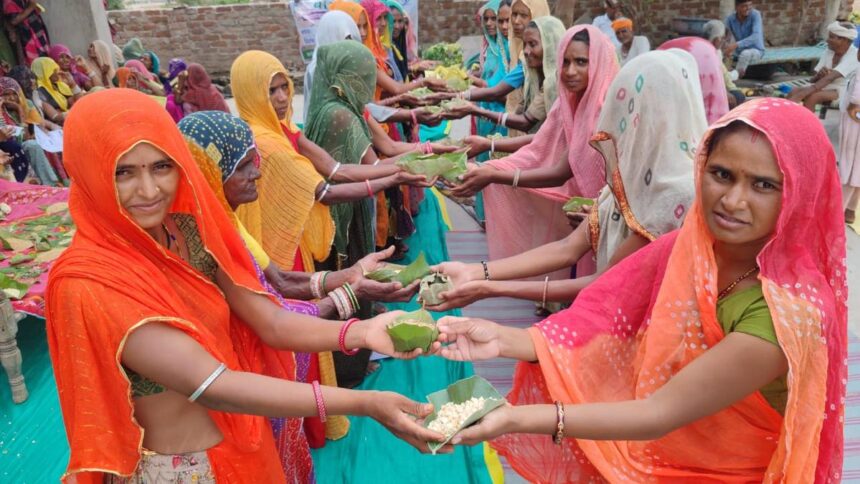[ad_1]

Tribal women farmers in southern Rajasthan take a pledge to protect their traditional practices to advance the 2030 agenda for SDGs.
| Photo Credit: Special Arrangement
The solutions offered by indigenous tribal communities in Rajasthan to global challenges, and their role in the execution of policies were highlighted at the High-Level Political Forum (HLPF) on Sustainable Development at the United Nations headquarters in New York over the weekend. A representative from the State spoke about the tribals’ traditional practices, which have helped protect their rich natural heritage.
The forum was held under the auspices of the U.N. Economic and Social Council (ECOSOC) with the theme, ‘Reinforcing the 2030 agenda and eradicating poverty in times of multiple crises: The effective delivery of sustainable, resilient and innovative solutions’. A ministerial declaration adopted at the forum called for renewed impetus to achieve the Sustainable Development Goals (SDGs).
ECOSOC president Paula Narvaez said the ministerial declaration had reinforced the urgency of implementing the 2030 agenda for sustainable development, while the U.N. body would continue to make multilateral efforts to fulfil the promise to “leave no one behind” in the implementation of SDGs.
Experts addressing the forum underlined the significance of acknowledging indigenous communities for their solutions in the context of biodiversity and ecosystems. The indigenous communities should be globally engaged in the formulation of strategies, which could offer vital insights into sustainable development through traditional practices, the experts said.
Jayesh Joshi, secretary of the Banswara-based voluntary group Vaagdhara, said the indigenous practices, rooted in reverence for natural and community-centric approaches, could promote sustainability and resilience, which were essential for reinforcing the 2030 agenda amid crises. “Indigenous solutions not only meet their own needs but also contribute to broader sustainability goals,” Mr. Joshi said.
Vaagdhara, working on the tribal livelihood issues in southern Rajasthan, recently organised over 90 events in the region as part of its movement for preservation of indigenous seed varieties to restore links between crop diversity and climate resilience. Mr. Joshi said the tribal farmers had taken a pledge at these events to save indigenous seeds and use them in their regular agricultural practice.
Mr. Joshi said since the global community was facing an unprecedented crisis, including climate change and its socio-economic consequences, the other challenges of economic inequality and environmental degradation would only aggravate in the near future. The tribals in Rajasthan had adopted an innovative approach guided by sustainable and resilient solutions across environmental, social, cultural, and economic systems, he added.
“Drawing from the principles of swaraj (sovereignty), tribals’ lifestyle and cultural values have led to self-sufficiency, less dependence on external sources, and enhanced agricultural practices, which ensure food, nutrition and livelihood security for their families,” Mr. Joshi said. Indigenous people should be incorporated in all action plans to recognise and overcome challenges that impede their engagement in various programmes, he said.
The Vaagdhara secretary pointed out that the initiatives based on seed sovereignty, soil sovereignty, food and nutrition sovereignty, water sovereignty and cultural sovereignty had empowered tribal communities in the State to collectively overcome critical challenges.
Mr. Joshi and other participants threw light on the global efforts to defend the rights of indigenous and vulnerable communities and protect their farming systems, livelihood and habitats. In Rajasthan, tribals in Banswara, Dungarpur, Pratapgarh and Udaipur districts have made collective efforts to save the vital elements of water, forest, land and seed, which are crucial for their survival.
The best practices of tribals highlighted at the forum included the production of local seeds, water conservation at source, use of animals in agriculture, checking soil erosion through mixed cropping, and the use of uncultivated food for nutritional security. These practices have helped tribal communities reduce their dependence on the market and survive during the difficult phases, including the COVID-19 pandemic in 2020-21.
Mr. Joshi said the traditional practices of tribal communities would not only fulfil their own aspirations, providing them with sustainable and resilient solutions, but would also help address the issues of poverty, inequality and vulnerability, in order to potentially advance the 2030 agenda for SDGs.
[ad_2]
Source link







